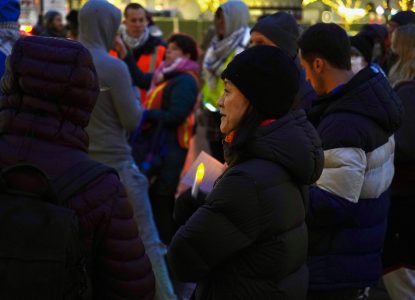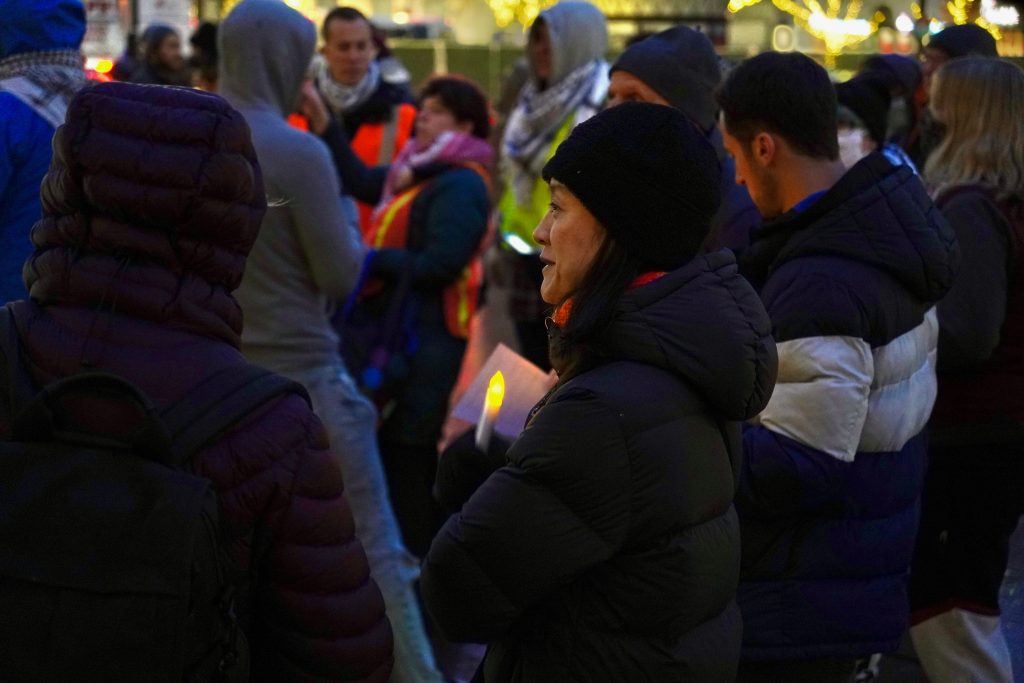By JoAnne Wadsworth, Communications Consultant, G20 Interfaith Forum.
– – –
On July 24, 2025, the G20 Interfaith Forum hosted its third “Faith in Action: Reflections” webinar, focusing on “Addressing Interreligious Tensions Through Literacy and Enhancing Understanding and Harmony.” The discussion brought together diverse faith leaders and practitioners to examine the root causes of religious conflict and explore pathways toward greater interfaith cooperation. The panel featured Michael Swain, Vice Chair of IF20 and Executive Director of Freedom of Religion South Africa; Lorato Scherpenhuyzen, a traditional healer, activist, and community leader who founded the NPO Gizweni and serves marginalized communities; Dr. Charmaine January, a higher education specialist and member of the Baha’i Faith who serves on the Baha’i Office of Public Affairs; and Mu-Aalima Fakude, an activist scholar specializing in human rights and interfaith work with focus on global justice issues. The conversation was moderated by Sandile Makasi and Yashika Singh.
Religious tensions continue to manifest across the globe, from persecution and violence targeting specific faith communities to subtle forms of discrimination that divide families and neighborhoods. While religion fundamentally seeks to promote harmony and human flourishing, the panelists explored how ignorance, power dynamics, and economic interests often distort faith traditions into sources of conflict. The discussion addressed both the painful realities of contemporary religious division and practical pathways toward greater understanding, emphasizing that constitutional protections alone cannot create the social transformation needed for genuine interfaith harmony.

Root Causes of Religious Tension
The panelists identified ignorance, power struggles, and economic interests as fundamental drivers of religious conflict. Scherpenhuyzen emphasized that conflicts stem from intolerance, misunderstanding, and lack of respect for other religions, often perpetuated by those seeking power over others. Swain highlighted the dangerous cycle where lack of knowledge breeds fear, which in turn fuels hostility toward other faith traditions.
“I sincerely believe that one of the biggest challenges is the fact that we know so little about the other’s religion. It’s ignorance. And ignorance is not a good thing, because if you don’t understand something, very often you fear it.” – Michael Swain
January noted that religious prejudice is particularly tragic because religion fundamentally concerns harmony, yet secondary aspects often become overemphasized at the expense of unity and love. The discussion revealed how economic and land issues frequently masquerade as religious conflicts, with faith being weaponized for material gain.
Ignorance, Misinformation, and the Need for Religious Literacy
The conversation revealed how misinformation creates barriers between communities, often within families themselves. Scherpenhuyzen described how Christianity’s arrival in Africa demonized traditional practices, creating shame and division within families and leading to traditional healers being called “possessed by demons” and “heathens.”
“When Christianity came into our countries, they demonized our African practices and religions. They told people that we are possessed by demons – that we are heathens and primitive.” – Lorato Scherpenhuyzen
January emphasized that religious literacy must extend beyond academic institutions to include media, community engagement, and practical interfaith experiences. She argued that current educational systems prepare people for competition rather than collaboration, perpetuating cultures of contestation that fuel religious tensions. Fakude highlighted economic barriers to meaningful interfaith engagement and noted how religious leaders often create “classism” through academic credentials that intimidate communities.
“When we appear before our congregations we are wearing our graduations and our qualifications, and they don’t have all that. So we ourselves, as faith leaders, create classism among people.” – Mu-Aalima Fakude
Authentic Religion vs. Weaponization of Faith
A central theme emerged around distinguishing authentic religious practice from manipulation of faith for worldly gain. January argued that using religion to gain economic, political, or social advantage represents a fundamental corruption of religious intent. Fakude distinguished between following religious traditions and adhering to divine scripture, arguing that human-made religious practices often create barriers contradicting spiritual teachings.
“If one uses one’s religion, or weaponizes it to gain advantage through land, economic power, any form of advantage, in my view, it’s not the intended purpose of religion. I’ll go so far as to say it’s a corruption of religious intent and the very existence of religion.” – Dr. Charmaine January
This connected to discussions about faith leadership responsibility. Fakude challenged religious leaders to provide a moral compass for society rather than accommodating political and economic powers, arguing that leaders often compromise their prophetic voice out of fear of losing congregants or political favor.
“Humanity is waiting for faith leadership to take their rightful place and occupy the position of society’s moral compass unashamedly, calling out everything that is unworldly.” – Mu-Aalima Fakude
Religious Freedom as Common Ground
Swain shared examples of how religious freedom serves as a unifying principle bringing diverse faith communities together when facing common threats. During COVID-19 lockdowns, faith leaders from disparate traditions united to challenge government restrictions that prevented religious assembly while allowing gyms and casinos to operate.
“We have found faith leaders from disparate faiths, people who probably wouldn’t know anything about one another or may even be potentially hostile to one another, coming together under the common rubric of religious freedom. In other words, they found a common cause.” – Michael Swain
This collaboration revealed how shared challenges can break down barriers and create opportunities for mutual understanding across religious divides.
Practical Steps Forward
The panelists outlined concrete actions for building interfaith understanding and cooperation:
Grassroots Engagement:
- Take interfaith dialogues to marginalized communities, particularly informal settlements
- Organize joint prayer and fellowship gatherings across religious traditions
- Address trauma and healing needs in communities affected by religious conflict
- Provide platforms for marginalized religious traditions to explain their practices
Institutional and Personal Changes:
- Develop religious literacy programs including multiple faith perspectives
- Create educational curricula emphasizing collaboration over competition
- Establish legal protections for authentic religious freedom and expression
- Build coalitions to resist government attempts to control religious communities
The webinar concluded with a powerful story about personal transformation: an imam who learned to greet pastors on the street instead of crossing to avoid them. This illustrated how individual changes in attitude and behavior can transform interfaith relations. Makasi emphasized that each person can choose to better understand different faith traditions and make others feel welcomed through love, generosity, and goodness.
The South African Context
The discussion was grounded in South Africa’s unique experience as a diverse society where religious communities once united against apartheid but continue to face contemporary challenges. While South Africa’s constitution provides strong protections for religious freedom, the panelists noted a troubling trend across sub-Saharan Africa where governments seek to license and control religious organizations. Swain warned that such state control represents an existential threat to religious freedom, potentially transforming it from a fundamental right into a revocable privilege. The conversation highlighted how South Africa’s experience—with both its constitutional protections and ongoing social tensions—offers lessons for building genuine interfaith harmony that extends beyond legal frameworks to create authentic understanding and respect across religious communities.
– – –
JoAnne Wadsworth is a Communications Consultant for the G20 Interfaith Forum Association and Editor of the Viewpoints Blog.



